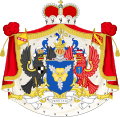| Portfolio | Minister | Took office | Left office | Party |
|---|
| Minister President [a] | | October 8, 1862 | December 21, 1872 |
| January 1, 1873 | November 9, 1873 |
| November 9, 1873 | March 30, 1890 |
| Deputy Prime Minister | | November 9, 1873 | March 23, 1878 |
| 1 June 1878 | 20 June 1881 | | DRP |
| October 8, 1881 | June 8, 1888 | | DKP |
| August 16, 1888 | March 30, 1890 |
| Minister of Foreign Affairs | | September 23, 1862 | October 8, 1862 |
| October 8, 1862 | March 30, 1890 |
| Minister of Finance | | September 23, 1862 | September 30, 1862 |
| September 30, 1862 | June 2, 1866 | | Conservative |
| June 2, 1866 | October 26, 1869 | | |
| October 26, 1869 | March 23, 1878 | | Liberals |
| March 30, 1878 | July 5, 1879 | | NLP |
| July 5, 1879 | June 28, 1882 | | |
| June 28, 1882 | March 30, 1890 | | DRP |
| Minister of Spiritual, Educational and Medical Affairs | | September 23, 1862 | January 17/22, 1872 | | |
| January 22, 1872 | July 13, 1879 | | Old Liberals |
| July 13, 1879 | June 17, 1881 | | DKP |
| June 17, 1881 | March 30, 1890 | | DKP |
| Minister of Justice | | September 23, 1862 | December 5, 1867 | | Conservative |
| December 5, 1867 | October 29, 1879 |
| October 29, 1879 | January 16, 1889 |
| January 31, 1889 | March 30, 1890 |
Minister of Trade, Commerce and Public Works
(until April 17, 1878, then Trade and Commerce) | | September 30, 1862 | October 8, 1862 | | KP |
| October 8/December 8, 1862 | April 23/May 13, 1873 | | Conservative |
| April 23/May 13, 1873 | March 30, 1878 | | DRP |
| March 30, 1878 | March 14/July 14, 1879 | | |
| March 14/July 14, 1879 | August 23, 1880 | | |
| September 13, 1880 | January 31, 1890 | | |
| January 31, 1890 | March 30, 1890 | | |
Minister of Public Works
(from April 17, 1878) | | April 17, 1878 | March 3, 1879 | | DRP |
| July 14, 1879 | March 30, 1890 | | |
| Minister of Interior Affairs | | September 23, 1862 | December 8, 1862 | | KP |
| December 8, 1862 | March 30, 1878 | | |
| March 30, 1878 | February 25, 1881 | | DKP |
| June 17, 1881 | June 8, 1888 | | DKP |
| July 2, 1888 | March 30, 1890 | | |
| Minister of War | | September 23, 1873 | January 1/November 9, 1873 | | Conservative |
| January 1/November 9, 1873 | March 3, 1883 | | |
| March 3, 1883 | April 8, 1889 | | |
| April 8, 1889 | March 30, 1890 | | |
Minister of Agriculture
(until March 13, 1879, then Agriculture, Domains and Forestry) | | September 23, 1862 | December 8, 1862 | | Conservative |
| December 8, 1862 | January 13, 1873 | | Conservative |
| January 13, 1873 | December 8, 1873 | | Conservative |
| December 8, 1873 | September 19, 1874 | | DRP |
| September 19, 1874 | July 13, 1879 | | DRP |
| July 13, 1879 | March 30, 1890 | | DRP |
Naval Minister
(until December 31, 1871) | | October 8, 1862 | March 30, 1890 | | |


